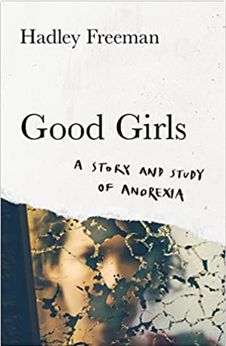An eating disorder is a mental disorder defined by abnormal eating behaviors that negatively affect a person's physical or mental health. Types of eating disorders include binge eating disorder, where the patient eats a large amount in a short period of time; anorexia nervosa, where the person has an intense fear of gaining weight and restricts food or overexercises to manage this fear; bulimia nervosa, where individuals eat a large quantity (binging) then try to rid themselves of the food (purging); pica, where the patient eats non-food items; rumination syndrome, where the patient regurgitates undigested or minimally digested food; avoidant/restrictive food intake disorder (ARFID), where people have a reduced or selective food intake due to some psychological reasons; and a group of other specified feeding or eating disorders. Anxiety disorders, depression and substance abuse are common among people with eating disorders. These disorders do not include obesity. People often experience comorbidity between an eating disorder and OCD. It is estimated 20–60% of patients with an ED have a history of OCD.

Bulimia nervosa, also known as simply bulimia, is an eating disorder characterized by binge eating followed by purging or fasting, and excessive concern with body shape and weight. This activity aims to expel the body of calories eaten from the binging phase of the process. Binge eating refers to eating a large amount of food in a short amount of time. Purging refers to the attempts to get rid of the food consumed. This may be done by vomiting or taking laxatives.
Promotion of anorexia is the promotion of behaviors related to the eating disorder anorexia nervosa. It is often referred to simply as pro-ana or ana. The lesser-used term pro-mia refers likewise to bulimia nervosa and is sometimes used interchangeably with pro-ana. Pro-ana groups differ widely in their stances. Most claim that they exist mainly as a non-judgmental environment for anorexics; a place to turn to, to discuss their illness, and to support those who choose to enter recovery. Others deny anorexia nervosa is a mental illness and claim instead that it is a lifestyle choice that should be respected by doctors and family.

Kate Moss is a British model. Arriving towards the end of the "supermodel era", Moss rose to fame in the early 1990s as part of the heroin chic fashion trend. Her collaborations with Calvin Klein brought her to fashion icon status. She is known for her waifish figure, and role in size zero fashion. Moss has had her own clothing range, has been involved in musical projects, and is also a contributing fashion editor for British Vogue. In 2012, she came second on the Forbes top-earning models list, with estimated earnings of $9.2 million in one year. The accolades she has received for modelling include the 2013 British Fashion Awards acknowledging her contribution to fashion over 25 years, while Time named her one of the world's 100 most influential people in 2007.

Karen Anne Carpenter was an American singer and drummer who formed half of the highly successful duo the Carpenters with her older brother Richard. With a distinctive three-octave contralto range, she was praised by her peers for her vocal skills. Carpenter's work continues to attract praise, including appearing on Rolling Stone's 2010 list of the 100 greatest singers of all time.
Marian Price, also known by her married name as Marian McGlinchey, is a former Provisional Irish Republican Army (IRA) volunteer.

Ana Carolina Reston Macan was a Brazilian model.

A fasting girl was one of a number of young Victorian era girls, usually pre-adolescent, who claimed to be able to survive over indefinitely long periods of time without consuming any food or other nourishment. In addition to refusing food, fasting girls claimed to have special religious or magical powers.
Ellen West (1888–1921) was a patient of Dr. Ludwig Binswanger who had anorexia nervosa. She became a famous example of Daseinsanalysis who died by suicide at age 33 by poisoning herself.
Wannarexia, or anorexic yearning, is a label applied to someone who claims to have anorexia nervosa, or wishes they did, but does not. These individuals are also called wannarexic, “wanna-be ana” or "anorexic wannabe". The neologism wannarexia is a portmanteau of the latter two terms. It may be used as a pejorative term.

Isabelle Caro Rosenbohm was a French model and actress from Marseille, France, who became well known after appearing in a controversial advertising campaign "No Anorexia" which showed Caro with vertebrae and facial bones showing under her skin in a picture by photographer Oliviero Toscani.

Anorexia mirabilis, also known as holy anorexia or inedia prodigiosa or colloquially as fasting girls, is an eating disorder, similar to that of anorexia nervosa, that was common in, but not restricted to, the Middle Ages in Europe, largely affecting Catholic nuns and religious women. Self-starvation was common among religious women, as a way to imitate the suffering of Jesus in his torments during the Passion, as women were largely restricted to causing themselves voluntary pain by fasting, whereas holy men experienced suffering through physical punishment.
Alexandra Nicole Michael, is an American model.

Anorexia nervosa (AN), often referred to simply as anorexia, is an eating disorder characterized by food restriction, body image disturbance, fear of gaining weight, and an overpowering desire to be thin.
Celia Monica Hammond is an Australian former politician and former academic who was a member of the House of Representatives from the 2019 federal election to the 2022 federal election. She was a member of the Liberal Party and represented the Division of Curtin in Western Australia. She succeeded retiring Liberal MP Julie Bishop at the 2019 election and was defeated at the 2022 election by independent candidate Kate Chaney. Hammond previously served as the vice-chancellor of the University of Notre Dame Australia from 2008 to 2019.

Kate Tchanturia is a British psychologist who is a professor of psychology in eating disorders at the Institute of Psychiatry, Psychology and Neuroscience, King’s College London. She is also Consultant Psychologist at the South London and Maudsley NHS Foundation Trust for the National Eating Disorder Service, and president of the Eating Disorders Research Society. Her main research interests include cultural differences in illness presentations, cognitive profiles in eating disorders, and experimental work in emotion processing and translational research from experimental findings to real clinical practice. Tchanturia has a particular interest in women’s mental health and has pioneered the PEACE pathway for autism and eating disorder comorbidity.
Atypical anorexia nervosa is an eating disorder in which individuals meet all the qualifications for anorexia nervosa, including a body image disturbance and a history of restrictive eating and weight loss, except that they are not currently underweight. Atypical anorexia qualifies as a mental health disorder in the Diagnostic and Statistical Manual of Mental Disorders (DSM-5), under the category Other Specified Feeding and Eating Disorders (OSFED). The characteristics of people with atypical anorexia generally do not differ significantly from anorexia nervosa patients except for their current weight.

Letting Ana Go is a 2013 book about a girl suffering from anorexia nervosa, published anonymously with no discernible author. The main character, "Ana", is a sophomore student and athletic track star who keeps a strict food diary and finds herself growing increasingly distant from her own family, while her own mother struggles with newfound morbid obesity and separation from her husband. The book calls into question the mental healthcare system in The United States and the financial cost of such care as a barrier to sufferers of issues like eating disorders. Letting Ana Go was published under various imprints of Simon & Schuster in 2013.

Good Girls: A story and study of anorexia is a 2023 autobiographical memoir written by Hadley Freeman, and published by Fourth Estate for HarperCollins. The book explores Freeman's struggles with anorexia nervosa from age 14 to 17, and subsequently with obsessive–compulsive disorder and addiction to cocaine. It was also published in the United States by Simon & Schuster.











